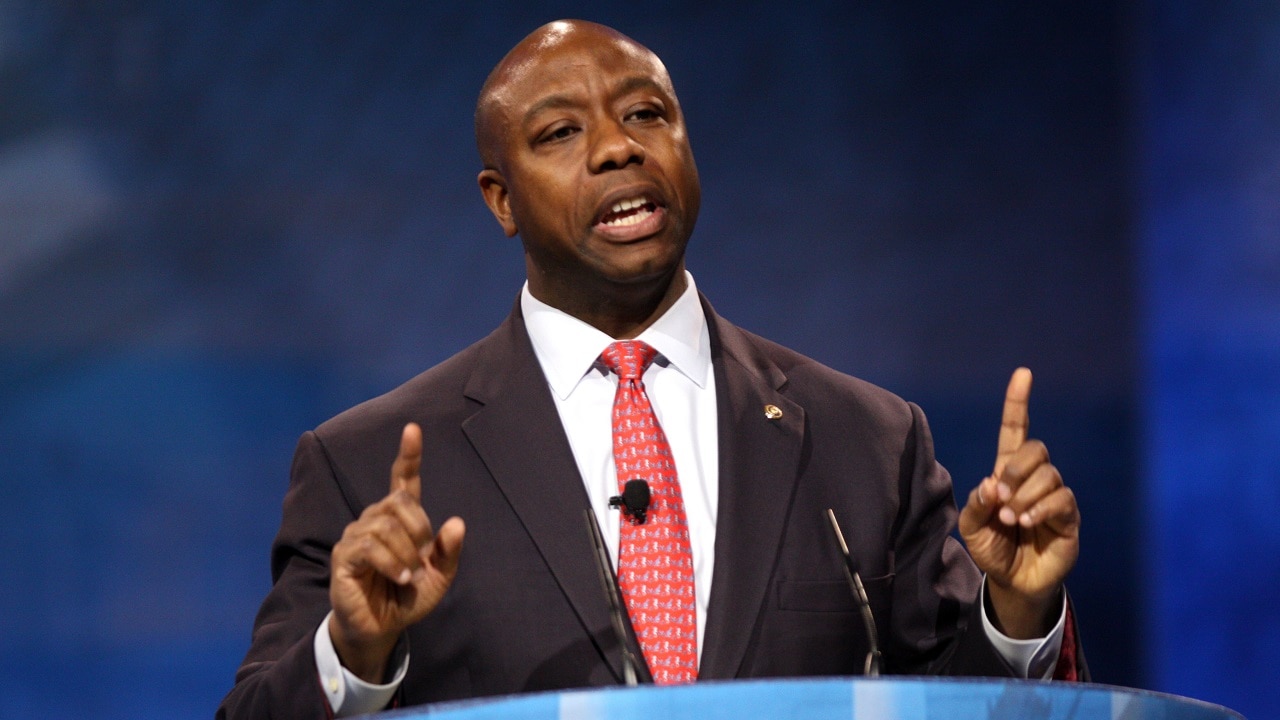Republican senator from South Carolina Tim Scott announced yesterday that he will be joining the handful of other candidates in the contest for the GOP primary nomination.
The Role of Race
Not many know Scott’s record in Congress, where he stands on crucial policy issues, or which committees he sits on.
But they do know the color of his skin.
Depending on where one sits on the political fence, Scott has been called everything from an “anomaly” to an “Uncle Tom,” and in the crudest terms, a member of the “c–n squad.”
All monikers point to two of Scott’s most defining characteristics: black and conservative.
This combination truly baffles and even scares the left, as if the two terms are mutually exclusive. As Scott has said himself, “I disrupt their narrative.”
Someone once commented to me that “you can make a lot money being a black intellectual denying racism on Fox News” when asked about a conversation between Shelby Steele and Peter Robinson of the Hoover Institution.
It’s as if the only reason an African American would claim to be a conservative would be to gain political or financial favor.
Never mind abiding by principles or moral values, particularly those fashioned by the Christian faith.
That’s nonsense to the left.
Injection of Faith
Yet aside from the color of his skin, Scott’s faith is his most significant attribute. He’d probably put it first.
The senator from South Carolina often quotes scriptures in speeches. In preparation for his announcement, Scott titled the series of speeches he offered as he toured across the country “Faith In America.”
Add this to the list of topics that tend to make the left really uncomfortable.
As sure as the sun rises, Scott’s commitment as a believer will be vehemently attacked by his opponents, likely on both sides of the aisle.
Pros or Cons?
Back in 2021, a Politico article pointed to just how notable Scott’s race is to his career, commenting that he is often referred to as “the lone Black Republican senator” as if it’s part of his job title.
This will either be Scott’s biggest weakness or greatest advantage.
If his race becomes the sole focus of his campaign, it will detract from voters’ ability to listen to his ideas on key issues such as economic, foreign, and fiscal policy.
His campaign will consist of one note that will go flat quickly.
Conversely, Scott’s story is unique, memorable, and praiseworthy. Not only is he black, but he also grew up in a disadvantaged household. He was the son of a single mother and the grandson of a man forced to drop out of elementary school to pick cotton.
Despite a challenging childhood, Scott maintained an optimistic outlook throughout his life, rooted in Christian hope.
Scott consistently reminds his supporters that he is living proof that the American experiment works. His personal tagline embodies the spirit – “from cotton to congress.”
However, some African Americans may view him as the exception rather than the rule and his Christianity as a source for so-called white supremacy.
In a culture that increasingly prioritizes victimhood over empowerment, some critics claim Scott’s policies don’t support black communities.
Scott joins the ranks of many prominent conservatives such as Candace Owens and Larry Elder, who espouse a similar rejection of what many call black victim culture.
While Scott’s personal history and story make him a compelling candidate it’s only part of the equation.
One thing is for sure, Scott’s race, along with his faith, will be anything but ignored.
A Message of Hope
I, for one, am happy Scott has decided to throw his hat in the ring. While he may not win, his voice should be heard and amplified.
Along with the justified reproaches of the Biden administration, Scott brings a much-needed message of optimism to the bitter battleground of politics right now.
He embodies a phrase that seems like an oxymoron: joyful politics.
In an interview with Kevin Roberts, the president of the Heritage Foundation, Scott proclaimed “The truth is joy comes from the inside. For me, joy starts with my relationship with the Lord. Without that, I don’t know how you have joy. But with it I’m not sure how you don’t have it.”
The senator continued with, “I have a responsibility to be joy filled . . . if you do that, I think you lead in a different direction.”
If Scott maintains an unwavering sense of joy even during a primary run, well – that may be his most noteworthy accomplishment yet.
It may not be the mainstream way right now, or more importantly, the winning way. Still, Scott’s willingness to inject faith and empowerment into the political conversation offers a different path forward for the future – even if it’s not one most will choose.
Jennifer Galardi is the politics and culture editor for 19FortyFive.com. She has a Master’s in Public Policy from Pepperdine University and produces and hosts the podcast Connection with conversations that address health, culture, politics and policy. In a previous life, she wrote for publications in the health, fitness, and nutrition space. In addition, her pieces have been published in the Epoch Times and Pepperdine Policy Review.

